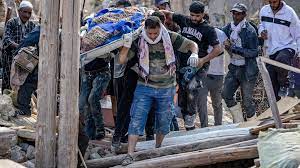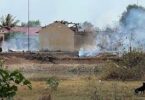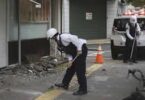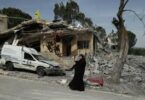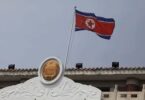RABAT (AFP): Rescuers on Monday faced a growing race against time to dig any survivors from the rubble of devastated villages in Morocco’s Atlas mountains, three days after the country’s strongest-ever earthquake.
The 6.8-magnitude quake that struck late Friday southwest of the city of Marrakesh has claimed more than 2,100 lives and injured over 2,400, many seriously, according to official figures updated late on Sunday.
Rabat on Sunday announced it had accepted aid offers from four foreign nations, while many other countries have also said they were willing to send assistance.
Authorities have responded favourably “at this stage” to offers from Spain, Britain, Qatar and the United Arab Emirates “to send search and rescue teams”, the interior ministry said.
It noted the foreign teams were in contact with Moroccan authorities to coordinate efforts, and said only four offers had been accepted because “a lack of coordination could be counterproductive”.
Other offers may be accepted in the future “if the needs evolve”, according to the ministry.
France was willing to provide aid “the second” Morocco requested it, President Emmanuel Macron said.
A Qatari aid flight left from Al-Udeid air base outside Doha on Sunday evening, an AFP journalist said.
Spain has sent 86 rescuers and eight search dogs to Morocco to “help in the search and rescue of survivors of the devastating earthquake suffered in our neighbouring country”, said a defence ministry statement.
“We will send whatever is needed because everyone knows that these first hours are key, especially if there are people buried under rubble,” Spanish Defence Minister Margarita Robles told public television.
– Villages flattened –
The earthquake wiped out entire villages in the hills of the Atlas mountain range, where civilian rescuers and members of Morocco’s armed forces have searched for survivors and the bodies of the dead.
Many houses in remote mountain villages were built from mud bricks.
The remote village of Tafeghaghte, 60 kilometres (40 miles) from Marrakesh in Al-Haouz province, was almost entirely destroyed, an AFP team reported, with very few buildings still standing.
“Everyone is gone! My heart is broken. I am inconsolable,” cried Zahra Benbrik, 62, who said she had lost 18 relatives.
Authorities recorded more than 1,300 deaths in Al-Haouz province alone.
According to Moroccan public television, “more than 18,000 families have been affected” by the quake in Al-Haouz, site of its epicentre.
The education ministry announced that classes in the worst-hit villages of Al-Haouz were “suspended”, and schools would not be open from Monday.
Citizens on Sunday rushed to hospitals in Marrakesh to donate blood to help the injured while many mobilised to help those affected.
Some parts of Marrakesh’s historic medina and its network of alleyways saw significant damage, with mounds of rubble and crumpled buildings.
The kingdom has declared three days of national mourning.
The Red Cross warned it could take years to repair the damage caused by the quake.
“It won’t be a matter of a week or two… We are counting on a response that will take months, if not years,” said Hossam Elsharkawi, its Middle East and North Africa director.
The quake was the deadliest in Morocco since a 1960 earthquake destroyed Agadir, killing more than 12,000 people.
A village vanishes
It was delicate work for the searchers to remove the woman’s body from the rubble of a village that effectively ceased to exist in Morocco’s deadliest earthquake in over six decades.
Her 25-year-old fiance Omar Ait Mbarek watched the digging Sunday with his eyes red and full of tears, and surrounded by onlookers, just kilometres from the quake epicentre in the Atlas Mountains.
He was on the phone with her when the shaking started late Friday and he heard kitchen utensils crash to the floor before the line cut out. He knew she was gone.
“What do you want me to say? I’m wounded,” he told AFP after Mina Ait Bihi, weeks from becoming his wife, was carried away in blankets to a makeshift cemetery that already held 68 others.
The men who had carefully used their hands to scoop away the dirt that covered her also found her phone and handed it over to the grieving man.
All around him the village of Tikht, previously home to at least 100 families, was a tangle of timbers, chunks of masonry as well as broken plates, shoes and the occasional intricately patterned rug.
“Life is finished here,” said Mohssin Aksum, 33, who had family living in the tiny settlement. “The village is dead.”
– Traditionally built homes –
Like many of the hardest-hit villages, it was a small rural place with a significant number of buildings constructed with a traditional mix of stone, timber and a mortar composed of mud.
Dozens of residents, mourning relatives and soldiers were gathered at the ruins. Several said they couldn’t remember any previous earthquake in the area.
“It wasn’t something people here thought about when building their houses,” said 23-year-old student Abdelrahman Edjal, who lost most of his family in the disaster.
But the quality of the building materials was not uppermost in his mind as he sat on a boulder among the rubble under the strikingly blue sky and surrounded by mountains.
He had gone out for a walk after dinner when the shaking began, and saw people trying to escape their collapsing houses.
He pulled his own father from the ruins of the family home, but the injuries were too serious. He died with his son close by.
Twisted steel reinforcement rods poked out of the debris in Tikht, so clearly some more recent building techniques were part of the local structures.
Daily life was already hard in the area, which is a roughly two-hour drive from the jobs that Marrakesh’s massive tourist industry can offer.
– ‘Less than nothing’ –
Aksum, who has local roots but lives in Rabat, said the quake has taken away the little bit that people had.
As he spoke, he gestured to his nose, and said the livestock that had been kept by locals was now buried under the debris and beginning to rot.
“Now, people have less than nothing,” he noted.
While he spoke, two young men in clothing streaked with the white dust of the ruins sat on boulders and cried, but said nothing.
By Sunday, emergency housing in the form of yellow tents was visible on the road into town.
Members of the government’s civil protection service were carrying camp beds from a military-type truck toward the tents.
Non-profit groups were also in the area, assessing what the people remaining in villages like Tikht need, beyond the obvious shelter, food and water.
Several people said they were still in shock over their losses and the scale of the damage, and could not say with any certainty what their next steps might be.
But Omar Ait Mbarek said he was sure of one thing.
“I will rebuild my house,” he said, still holding his late fiancee’s dust-covered phone, before walking away into the debris.

